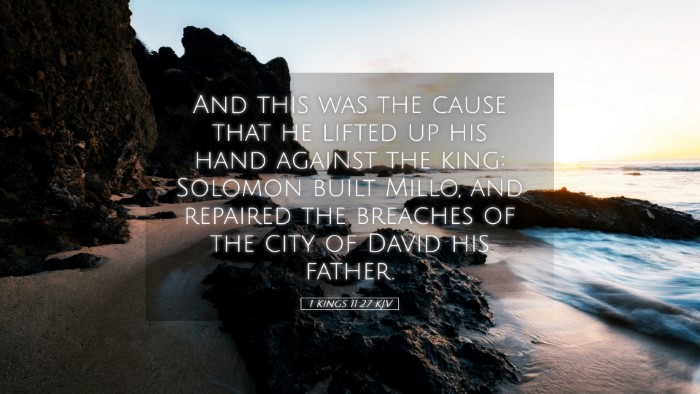Commentary on 1 Kings 11:27
Verse: "And this was the cause that he lifted up his hand against the king: Solomon built Millo, and repaired the breaches of the city of David his father."
Contextual Framework
The verse 1 Kings 11:27 references a critical moment in the history of Israel during the reign of King Solomon, a time marked by both unprecedented prosperity and developing discontent. Understanding this passage requires a view into the political and spiritual landscape of Israel at this time.
Historical Context
The reign of Solomon brought wealth and stability, yet it was also marked by idolatry and disobedience to God’s commandments. Solomon's turning away from the worship of Yahweh, largely influenced by his foreign wives, played a pivotal role in the events that followed. The ascent of Jeroboam is indicative of the underlying tensions between loyalty to the Davidic line and the dissatisfaction that arose from oppressive burdens and idolatrous practices.
Key Figures
- Solomon: The wise king who, despite his accomplishments, faced divine judgment for his disobedience.
- Jeroboam: An Ephraimite servant of Solomon who became a significant figure in the rebellion against the monarchy.
- Adonijah: Solomon’s half-brother, who represents the claim of the royal lineage that would challenge Solomon's reign.
Interpretative Insights
According to Matthew Henry, this verse illustrates the unrest that was brewing against Solomon due to his heavy taxation and forced labor policies. The construction of Millo and the fortifications reflect the king's ambition and desire for security; however, they also exemplify a misuse of power leading to discontent among the people.
Albert Barnes emphasizes that this construction work was pivotal; it not only represented economic burdens but also a shift in national loyalty. Barnes notes that Jeroboam’s rise was not merely a reaction to Solomon’s actions but a providential preparation for God’s judgment on the undivided kingdom. The construction projects symbolize a diversion of resources and a neglect of the spiritual welfare of the people.
Adam Clarke points out that the fortification and rebuilding represent a strategic shift not only politically but also theologically. The focus on physical security overshadowed the spiritual state of the nation. Clarke posits that this misalignment of priorities became the foundation for future division within the kingdom.
Theological Themes
- The Dangers of Power: This passage serves as a cautionary tale about the seductive nature of power. Solomon's overwhelming success stirred a spirit of rebellion that eventually led to God's judgment.
- The Weight of Responsibility: Those in leadership must recognize that their actions directly impact the well-being of their followers. Solomon neglected the needs of his people for personal glory.
- Divine Sovereignty: The rise of Jeroboam illustrates God's ultimate control over history. Even in human rebellion, Divine plans are fulfilled as seen in the eventual establishment of two kingdoms.
Lessons for Today
This verse prompts a reflection on contemporary leadership within the Church and society. The essence of godly leadership is humility, service, and a deep commitment to the spiritual welfare of the people. Leaders must align their priorities with divine mandates to avoid the pitfalls that led to Israel's fragmentation.
Moreover, the verse serves as a reminder of the importance of listening to the grievances of people; wisdom in leadership often comes from a place of attentiveness and responsiveness to God and His Word. As seen through the events surrounding Solomon's reign, neglecting this can lead to significant turmoil.
Conclusion
1 Kings 11:27 encapsulates more than just an historical account; it is a profound lesson on leadership, the consequences of misaligned priorities, and the overarching sovereignty of God. As pastors, students, and theologians meditate on this passage, the insights gleaned can guide both personal faith and collective church responsibility.
In summary, the commentary reflects a need for vigilance in leadership roles, an understanding of God's purposes through history, and a commitment to uphold the values of justice, mercy, and humility.


